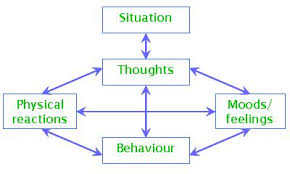It does seem so simple. From a distance it does not seem like it is even worthy of a drum-roll. Although, it is worth it and so much more. This simple adjustment in your life can reduce your stress level, lift your mood and help you focus on what is important. This key behavior is an attitude modification. Let me explain:
Instead of reacting to stress or crisis, learn to respond.
Instead of letting circumstances determine our mindset, master the skill of adjusting your attitude despite the circumstances.
Instead of letting the present here-and-now trouble control our emotions and thinking, contemplate hope, realize the trouble is temporary and maintain a positive outlook.
The simple serenity prayer is a great reminder. I say this everyday:
God, grant me the serenity to accept the things I cannot change,
The courage to change the things I can,
And wisdom to know the difference.
 *[Serenity = peace of mind.]
*[Serenity = peace of mind.]
How-to:
Let me offer some example. Imagine that there is a last minute office meeting in the board room, completely unplanned. You are put on the spot by your boss (the managing director of the building) to present to his boss (the CEO of the company). You are stressing out! The situation is stressful! Your first initial thoughts are not pleasant (“What am I doing?” “What am I suppose to say?” ” I want to hurt my boss, he should have given me a heads up!” “I am not going to look good.” “I hate this” – you get the idea). That initial thought is followed with emotions (nervous, stress, anxious, scared, embarrassed, unprepared, unworthy) and physical sensation (heart racing, mind cluttered, sweating, nerve pain, shallow quick breathing, blushing, chest tightness, tense muscles, light-headed, feeling out of control and fatigue). All three of these (initial cognitive thoughts, body’s reaction and emotional toll) of these naturally lead to a natural behavior (running to the bathroom, being tense and clamming up in the board room, raging anger towards boss in spite or sarcasm or worse a meltdown).
All of these behaviors are common natural reactions. Although, instead of behaving naturally, it is better to stop at each step and learn how to respond instead of merely react. The concept is simple in theory but in implementation it takes some practice. So first when we have those initial cognitive mental thoughts regarding a stressor, realize these are natural reactions. Everyone has these fleeting thoughts. The first thing we can do is instead of agree and listen to these thoughts, we can ignore them, or better, we can dispute them by thinking about the situation more rationally.
The second step is in the emotions and physical sensations, again these are natural feelings. At first it is very difficult to ignore these emotions. We shouldn’t. It is good to acknowledge these emotional feelings and research where they are coming from and why. Bottling up emotions is negative. Somethings just talking to someone is the biggest help.
Finally, our behavior. After having a bad day emotionally and cognitively, it is easy to just react with negative behavior. Although, even after dealing with emotions and thinking, we may still desire to do something negative emotionally. We still have to think about it. We still have a choice to make. We can, with some practice, choice to behave in a positive manner, even after a long negative day full of stressors.
Going back to the example, instead of embarrassing yourself and making the CEO and your boss like fools, you told yourself quietly that “I can do this!” and “I am awesome.” Positive self-talk disputes the negative thinking. Second you feel the anxiety but instead of letting it eat away at you, you choose to strike a confident posture and breathe deeply through-out the entire meeting. When the meeting is over you talk to your boss privately about how you were actually feeling. Also when you get home, you deal with more of your negative with your supportive spouse (ideally). Finally the behavior in the board room is driven my the positive reaction you are maintaining. Instead of despising your boss and acting immature, you are flexible and professional. You do your best honest work given the circumstances.
